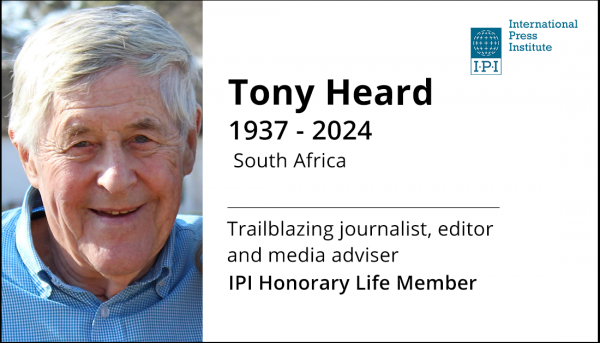IPI is alarmed that although South African Hefer Commission is now “inviting” journalists to attend it is still threatening to use subpoenas if they fail to appear.
According to information provided to the International Press Institute (IPI), the Hefer Commission is now “inviting” journalists to provide information to the body rather than compelling them to do so through the use of a subpoena.
In recent days, the Commission has extended these “invitations” to two journalists, Sunday Times editor Mathatha Tsedu and City Press journalist Elias Maluleke. Both Tsedu and Maluleke have refused to accept the Commission’s “invitation”.
However, IPI is worried at the apparent statement of Commission secretary John Bacon who was quoted as saying that if Maluleke failed to appear he would be “summonsed to do so”.
Speaking on the issue, IPI Director, Johan P. Fritz, said, “It would appear that the Hefer Commission has failed to learn from the events of the last few days. I would have expected the Commission to accept the fact that journalists have a fundamental right to protect their confidential sources.”
“By calling other editors and journalists, the Commission is seeking to test the links of the editorial chain in the hope that one of these links will break. The Commission members should bear in mind that it is the duty of those journalists in the chain to protect their colleagues’ confidential sources and whether ‘invited’ or ‘summonsed’ they will not break this confidence.”
“As a result, the Commission is engaged in a vain pursuit of journalists willing to speak out on this matter. They should desist immediately and continue with the Commission hearings.”
The above issue concerns a probe commissioned by South African President Thabo Mbeki and chaired by former Court of Appeal Judge President Josephus Hefer into allegations that Bulelani Ngcuka, the National Director of Prosecutions, had been investigated by the ruling African National Congress (ANC) into whether he was an apartheid spy for the National Intelligence Agency in the 1980s.
A journalist at the Sunday Times, Ranjeni Munusamy was approached by a confidential source who provided her with documents and information regarding the investigation into Ngcuka. She later went to her bosses at the Sunday Times, however, the newspaper refused to publish the story. She then gave the story to a rival publication City Press and co-authored an article on the subject. Because of this article the Hefer Commission tried to compel Munusamy to appear before it to give testimony on her confidential sources. She refused to attend leading to a clash between the Commission and press freedom groups.


